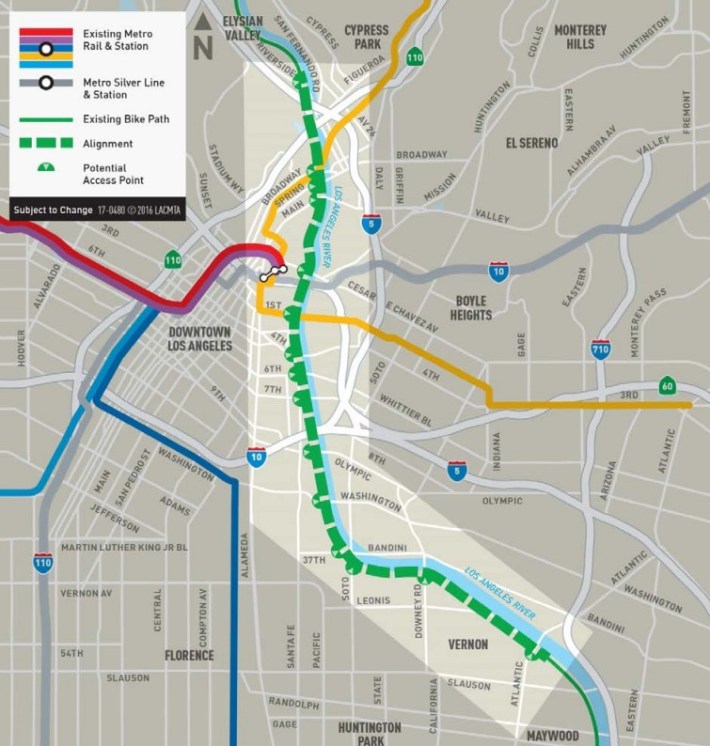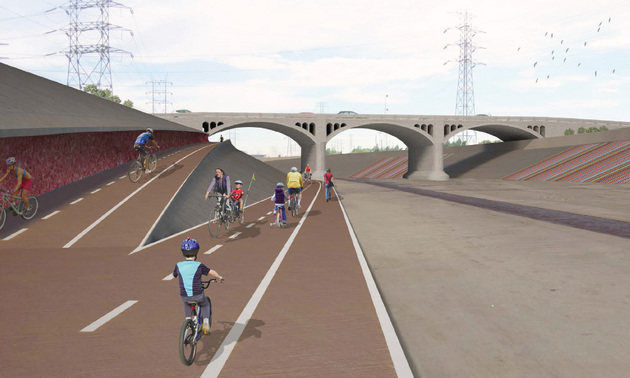This Thursday, the Metro board of directors is expected to vote on a contract for work to close the ~7.5 mile gap in the L.A. River bike/walk path through downtown L.A. and Vernon.
Today the L.A. River has a patchwork of intermittent bike/walk paths alongside just over half of its ~50 mile length. The longest bikeway stretch is in southeast L.A. County, where the trail extends ~17 miles from Atlantic Avenue, in the city of Vernon, all the way to the river's mouth in Long Beach. Upstream, the city of L.A. has a handful of river paths, the longest of which is just north of downtown Los Angeles, where the Glendale Narrows path extends about eight miles from Griffith Park to the Cypress Park neighborhood.

Between Cypress Park and Atlantic Avenue is a ~7.5 mile gap - where the river runs through downtown Los Angeles and the city of Vernon.
Building the path through this area is difficult, hence likely to be expensive. Through downtown, there is no existing maintenance road to convert to a path. There is also plenty of infrastructure a path would need to be threaded through: freeways, railroads, power towers, bridges (many historic), and more.
Nonetheless, the project is moving forward. The Measure M sales tax expenditure plan dedicates $365 million to closing the central gap in the path, as well as $60 million for finishing the remaining path through the San Fernando Valley. Measure M specifies that the entire ~50-miles of the L.A. River bike path would be completed by 2025-27. Those two river path projects are included in Metro's 28 by 28 initiative.
Before the Metro board this week is a $46 million contract with CH2M Hill for design, environmental clearance, permitting, right-of-way acquisition, and construction support. The staff recommendations also include an additional 15 percent contingency, and authority to enter into agreements with the underlying jurisdictions: the cities of Vernon and Los Angeles, and the L.A. County Department of Public Works which is responsible for flood protection. LACDPW would be responsible for construction management for the path project.
The item was heard at last week's meeting of the Metro Planning and Programming Committee. Due to boardmembers with conflicts of interest, the planning committee was unable to approve the item, so it was moved to the full board without recommendation.
At last week's committee hearing, public testimony on the item included representatives from non-profits: L.A. County Bicycle Coalition, From Lot To Spot, and Multicultural Communities for Mobility. The three representatives urged Metro to delay approving the contract until after engaging nearby communities.
This central stretch of the river almost entirely neighbors adjacent industrial areas, with only relatively small pockets of immediately-adjacent residential areas. In contrast, there are lots of people living within a couple miles of the project, so it will be the access point for nearby residential communities, many of which are high population density and low income communities of color. The project will serve nearby communities including Maywood, Huntington Park, Boyle Heights, Downtown L.A., Chinatown, William Mead Homes, and Lincoln Heights. The path will access plenty of job sites from downtown to Vernon and should provide access to the key transit hub of Union Station.
At last week's meeting, County Supervisor Hilda Solis expressed her support for greater community engagement, including encouraging Metro to work with community-based organizations. Metro's plan had been to conduct community engagement via an outreach contract from the agency's pre-approved contractor bench.
Another rocky shoal for Metro's river path project to navigate is potentially having to navigate between two big companies competing for the work. According to a snipe-laden account at CityWatch, there was little to differentiate competing bids from CH2M Hill and Tetra Tech, two large firms that have competed for river contracts in the past. Testifying at last week's meeting, From Lot To Spot Project Manager Maria De Leon expressed preference for Tetra Tech based on their "grassroots level community engagement." Metro staff are recommending CH2M Hill, though, as with many Metro contracts, the caveat that this would be "subject to resolution of protest(s)" likely from Tetra Tech.
Assuming Metro can approve the final technical contract this month, the design and environmental clearance work would take roughly four years. River path project construction is anticipated to start in 2023-24 and the path would open in 2026-27, within the three-year window Measure M schedule voters approved.
For more information on the river path gap closure project, see this extended article at Metro's The Source.
Updated 5/23 to correct SBLA errors in Measure M cost and schedule






